Welcome to our column, Russia Update, where we will be closely following day-to-day developments in Russia, including the Russian government’s foreign and domestic policies.
The previous issue is here, and see also our Russia This Week story The Guild War – How Should Journalists Treat Russian State Propagandists? and special features ‘Managed Spring’: How Moscow Parted Easily with the ‘Novorossiya’ Leaders, Putin ‘The Imperialist’ A Runner-Up For Time’s ‘Person of the Year’ and It’s Not Just Oil and Sanctions Killing Russia’s Economy, It’s Putin.
Please help The Interpreter to continue providing this valuable information service by making a donation towards our costsâ€.
UPDATES BELOW
A court rejected the attempt by the Soldiers’ Mothers of St. Petersburg to remove the designation of “foreign agent,” despite the fact that the group has no foreign funding.
Russian Prime Minister Dmitry Medvedev promised a harsh response from Russia if the West cuts Russia’s banks off from SWIFT, Vedomosti reported. The Interpreter has translated his remarks.
“In the event such decisions are made, I would like to note that our economic reaction, and indeed any other reaction of ours, will be unlimited,” he said at a meeting on animal husbandry in Bryansk.
Medvedev noted that in addition to other budgetary shortfalls in Russia, there is “an additional collection of restrictions we’ve encountered — that is, restrictions on financing, on liquidity,” he said.
“Foreign monetary markets are closed, and undoubtedly, that has an effect on the situation internally,” he stated.
Medvedev also criticized the rating agencies; S&P downgraded Russia to “junk” status yesterday.
“All these ratings about which many people are talking are obviously a political instrument in pure form,” he said.
He
added that ratings agencies make estimates of countries after other
countries have launched sanctions against them. “What is that if not a
political decision?” he asked.
— Catherine A. Fitzpatrick
Greece was launched back into the headlines this week when Alexis Tsipras, an anti-establishment and anti-austerity politician was sworn in as Prime Minister. As Anton Shekhovtsov explains, Tsipras has established a coalition government between his own party, the Greek Coalition of the Radical Left (SYRIZA), and the far right Independent Greeks party (ANEL).
But many may not be aware of how nakedly pro-Putin both parties are, potentially creating problems for both the European Union and NATO in their efforts to address Russia’s aggression in eastern Ukraine and Eastern Europe. Shekhovtsov writes:
Both SYRIZA and ANEL are so-called “anti-austerity parties” implying that they oppose reducing budget deficits as a response to the Greek financial crisis, as well as rejecting the austerity package put forth by the EU and the IMF. The “anti-austerity” platform may seem the only agenda that has drawn the two parties they share, but they also share a similar approach to foreign policy issues — an approach that may undermine the EU unity over the Russian threat.
Both parties are overtly pro-Russian, and SYRIZA’s leader Alexis Tsipras denounced the sanctions against Russia imposed by the EU for Russia’s annexation of Crimea and its invasion of Ukraine that has already cost Ukrainians thousands of lives. In May 2014, i.e. already after Russia had started its invasion of Ukraine, Tsipras travelled to Moscow to meet Vladimir Putin’s major allies such as Valentina Matviyenko, chairman of Federation Council of the Russian Federation, and Aleksey Pushkov, chairman of the Russian parliament’s foreign affairs committee. Both Matviyenko and Pushkov are sanctioned by the US, while Matviyenko is also sanctioned by the EU. This did not prevent Tsipras from holding a meeting with her.
The article goes on to explore how SYRIZA and ANEL have significant links to the Kremlin:
What Shekhovtsov and President Ilves make clear is that Greece’s internal politics could have geopolitical consequences, and nobody is happier to see SYRIZA come to power than Russian President Vladimir Putin.
We’ve been following the story of an alleged Russian spy ring which has been disrupted in New York. Three Russians have been named in the official government documents on the episode, one of whom is now in custody and two of whom have left the country. The three men allegedly worked to, among other things, uncover information related to U.S. sanctions against Russia due to its actions in Ukraine.
Last night we noted that a Russian state news agency was also implicated as working with the alleged spies, though that agency remained unnamed. We now know that the agency implicated in the scandal is TASS, formerly Itar-TASS.
TASS, which is a Russian government-owned news agency, has not yet come out with a statement. However, the media group did post two articles which appear to be defending the spy ring.
In the first, TASS quotes Russia’s Foreign Ministry spokesman Alexander Lukashevich, who said there is “no proof to back up the charges has been presented” by the FBI and federal prosecutors.
“One gets an impression the US authorities have decided to resort to their favourite tactic of unfolding spy scandals. Due to Washington’s hostile stance Russian-US relations have long experienced no easy times. Apparently, the United States follows ‘the worse – the better’ principle in an attempt to start another spiral of an anti-Russian campaign,” Lukashevich was quoted as saying by TASS…
“We insist on a stop to the string of provocations against Russian representatives unleashed by US secret services, and on immediate consular access to Buryakov, on the strict observance of the Russian citizen’s rights and on his release,” he also added.
— James Miller
Today the public inquiry into the case of the poisoning death of Russian defector Alexander Litvinko began.
The BBC’s Daniel Sanford, who once interviewed Lugovoi, the chief suspect in Litvinenko’s death, live-tweeted the hearing. Here are some selected tweets:
The transcripts of the Litvinenko inquiry will be published here as they become available. The Guardian also liveblogged the inquiry.
Of course, the real question is how the British judge will rule in this case, if the evidence proves that the Russian state was involved in the murder of Litvinenko.
As the UK has had close ties with Russia in recent years, particularly business ties that have led to a boom in British sotres, media, real estate and even a soccer team owned by Russians, there has been political unwillingness to go up against President Vladimir Putin.
But with the chill in relations over Putin’s war on Ukraine, and the imposition of Western sanctions, the UK may prove more willing to state the obvious about this Polonium poisoning of a former Russian spy who came to work with British intelligence to foil Russian organized crime.
Past reporting on the Litvinenko case from The Interpreter:
Marina Litvinenko: “Explain to Me Where the Polonium Came From?”
A Development In the Litvinenko Case
Marina Litvinenko Wins Suit Against British Government
A Public Inquiry into Litvinenko’s Death is Likely–And Necessary
The UK is Granting Russia ‘License to Kill’
— Catherine A. Fitzpatrick
In recent days, Russian state media and pro-Kremlin news outlets have been going full tilt with a claim that “NATO is fighting in Mariupol.”
Yesterday, the international community converged on Moscow with condemnation of the Russian-backed militants’ shelling of Mariupol in which 30 people were killed and 90 wounded — by a Grad crew commanded by a Russian officer, as the spotter arrested by Ukrainian authorities reported.
The responsibility for the firing of numerous Grad rockets on Mariupol appeared unmistakeable, as the separatists had clearly-established positions to the east of the city and many of the Grad rockets lodged in roads showed their trajectory was from the east.
So in response, there has been a barrage of Kremlin counter-propaganda claiming that “NATO is in Ukraine”. President Vladimir Putin gave a paranoid speech yesterday, in which for the first time, he characterized Ukrainian forces as a “NATO foreign legion.”
As there was no evidence for this “NATO foreign legion,” Russian propagandists came up with an incident claiming a soldier who told a camera-crew “out of my face” in idiomatic English was from NATO. The clip was broadcast on Russia’s TV1 and other channels:
At 0:41, the soldier can be seen putting his hand up in front of the camera and saying “out of my face”:
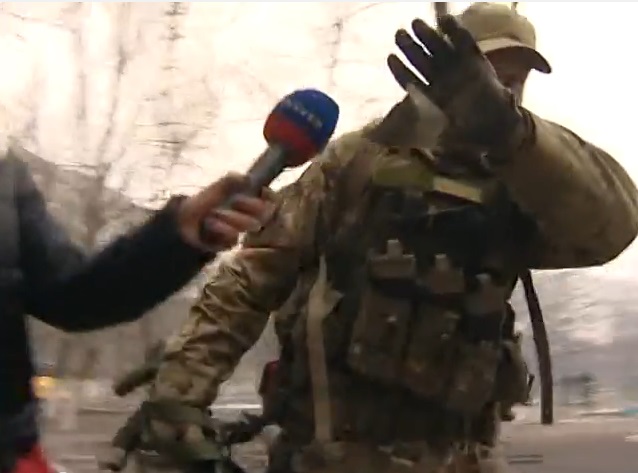
Possibly the soldier spoke in English, even though the TV journalist spoke in Russian, because he saw the English letters “MTV” which isn’t music television but stands for “Mariupol TV”.
This is a problem for “LifeNews,” as well, which seems to have wanted to give itself more international recognition by calling itself an English name — but which then can be perceived by locals as a foreign camera crew.
Maybe the soldier simply thought that was a great expression he had heard on TV.
But Russian propagandists have a more damning clip, which they take from the Azov Battalion video (which we reported January 24) in which a soldier is heard speaking at length to the cameraman about a Grad missile crater in a school yard:
At 0:11, we can see a soldier wearing his cap backwards, in the American style:
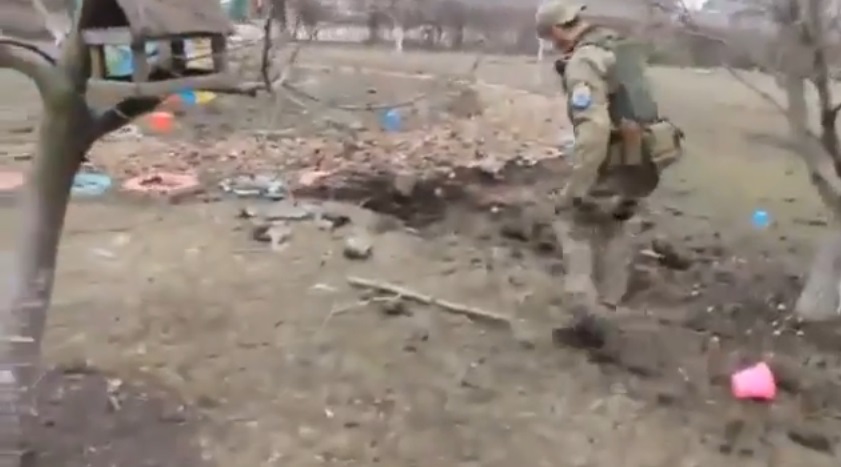
This soldier’s accent isn’t American but it might be British or Australian although he doesn’t sound like a native speaker, as he speaks in very short sentences, without proper grammar, drops articles, and has an unaspirated “k” in the word “school.” Here’s a transcript of the dialogue:
Azov soldier (cameraman): Is detected?
English-speaking soldier: It’s it’s right in.
Azov soldier: Uh-huh
English-speaking soldier: So. Maybe explode, maybe not…
Azov solider: Uh-huh
English-speaking soldier: So blow up in situ….Go to wall here.
Azov soldier: Uh-huh
English-speaking soldier: It’s a kindergarten, school?
Azov soldier: Yes, yes.
So it’s not confirmed that the person speaking English is in fact a foreigner — “blow up” and “school” are two words not pronounced like a native speaker.
It seems as if both videos are covering the same man with a khaki-colored cap and a green backpack. At 0:43 in the first video:
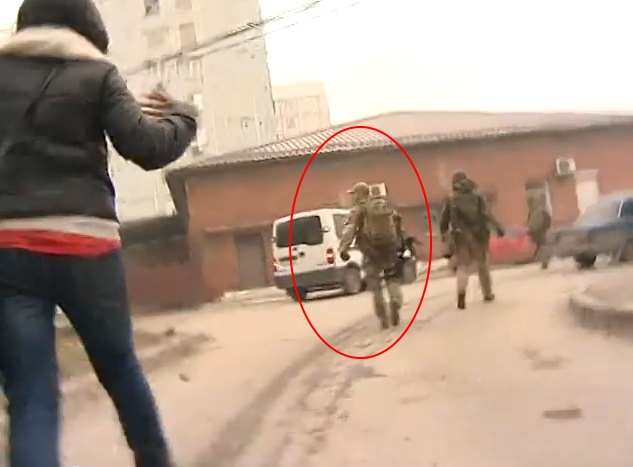
At 0:11 in the second video:
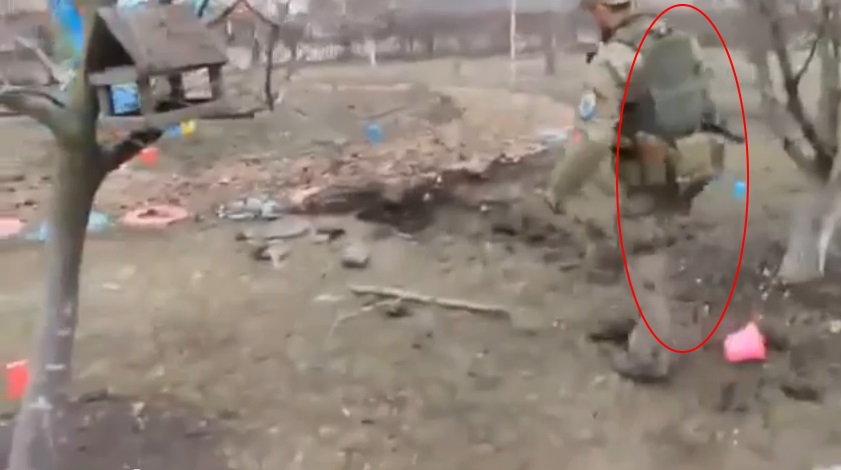
Why would both the cameraman and the other soldier speak in English at the end of this video footage of a devastated Mariupol?
One possibility is that the Azov cameraman, throughout the video, kept creating ready-made stand-alone clips that might be used in a television broadcast. Multiple times throughout the video, he stops people in the scene, asks them to introduce themselves, and asks them to repeat several times the name of the location and the city where they were, i.e. “School No. 5” and “city of Mariupol” — even though these facts were already obvious to the cameraman.
So perhaps the cameraman was hoping to create a ready-made episode that he could give to foreign news that would prove in particular a particularly dangerous situation — unexploded rockets in a school yard.
To be sure, there might actually be a foreign volunteer in Azov. Azov, an ultranationalist battalion known for its symbols similar to Nazi insignia, has received enormous scrutiny from some foreign and Russian media, because it seems to embody the worst case of much-feared Ukrainian nationalism.
Azov is said to have a Swedish white supremacist named Mikael Skillt in its ranks, and other European recruits seem to have been attracted to the battalion, according to Wikipedia.
The reason the fighter in the video may not sound like a native English speaker is that he could be Swedish or French or some other nationality, and English is a lingua franca with the Ukrainian soldier.
So perhaps this one man is a foreigner fighting for the Azov Battalion, but it hasn’t been proven.
Azov hasn’t commented on the allegations of having foreign fighters among them, and there hasn’t yet been any credible media investigating the story.
UPDATE:
The mystery of the foreign fighter in Azov Battalion has been solved, thanks to a reader:
So Garrett is British, not American, and the reason he spoke in such short, clipped sentences was that he was busy with the job he came to Ukraine to do: de-mining.
Thus, there are no “NATO legions,” but just a British specialist who came to Ukraine to help. No doubt the teachers and children of Day Care Center No. 5 in Mariupol will be glad that he identified unexploded Grad rockets on the center’s grounds, which we learn about from the full version of this video (11:10).
Garrett, who goes by the nickname “Swampy,” has replied to those claiming he is a “NATO agent”:
In response to the recent allegations of me being an american mercenary
paid by western governments. I shall soon release my own statement. For
now, here is my response to a certain twitter idiot
Garrett then published a photo of himself upside down:
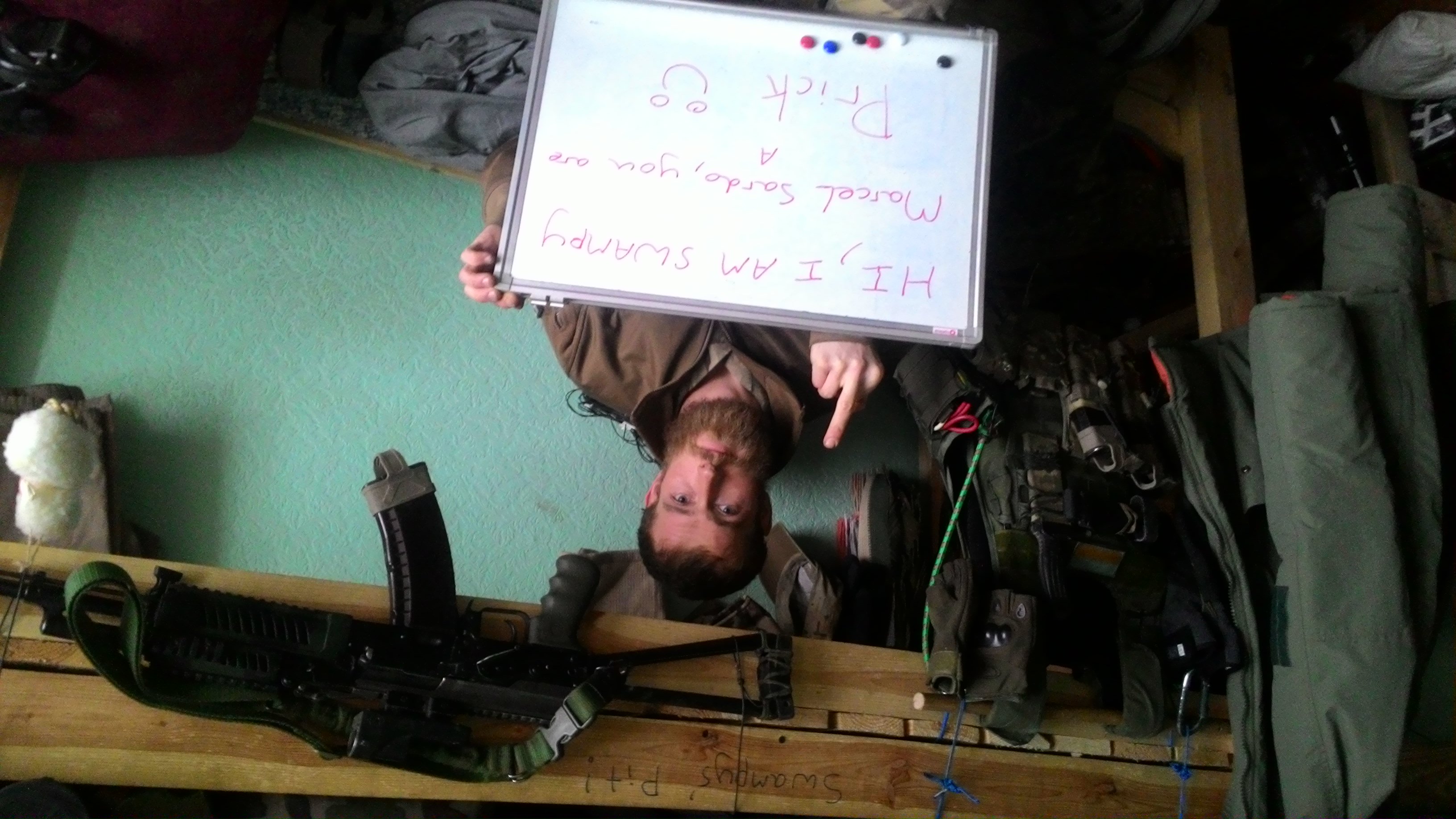
— Catherine A. Fitzpatrick
Remember last year when it seemed briefly as if Visa and MasterCard were going to help enforce sanctions against Russia?
When the US placed Russian banks in the sanctions list, it seemed as if a freezing of transactions by the two major credit card companies were going to go into effect, as we reported back in March 2014,
Visa and MasterCard have frozen transactions on credit cards from a
number of Russian banks, including Bank Rossiya, owned by Yury
Kovalchuk, described as “Putin’s cashier,” who was included in the White
House sanctions’ list announced yesterday in response to the illegal
annexation of the Crimea. The Rotenberg brothers are also included in
the list, so their SMP Bank is also affected, as are Sobinbank and
Investkapitalbank, reports RBC.
But the freeze didn’t last for long; by March 28, some of it was undone:
“At the present time, MasterCard’s operation is fully restored,
transactions on Visa cards will begin to go through in several hours as
channels of communication are established and the equipment is re-set.
Thus, the payment systems have acknowledged the error of their actions
regarding SMP Bank, whose cards were blocked after US sanctions were
taken regarding the chief share-holders of the bank.”
At the time, Russia said it would make its own payments system and work around Western sanctions.
Eventually, such a system was created, called the National System for Payment Cards (NSPK).
Now, Visa and Mastercard have joined the Russian NSPK, Yod reports.
Vedomosti reports that an agreement hasn’t actually been signed between the credit card companies and NSPK, but on January 23, Visa and NSPK sent out letters to businesses saying that they were cooperating on the transfer of domestic Russian transactions, according to two bankers who spoke to Vedomosti. The Central Bank, NSPK and Visa later confirmed to Vedomosti that such a letter had been sent.
By March 31, all international payment systems must turn over to NSPK the processing of transactions of cards inside Russia, or keep on deposit in the Central Bank 25% of their average week’s turnover of card transactions.
MasterCard has announced that it has signed an agreement with NSPK, although no other international companies have. Visa, which has 61% of the Russian credit card market has only said that it is “continuing to work with the Central Bank and NSPK in order to come to a decision suitable for all sides in the shortage possible time.”
The equipment required for processing the transactions is already being installed, but Visa has not been in a hurry to make a deal, says Vedomosti.
First, it would have to change its transfers from VTB to the Central Bank. Second, there will be fees for transactions starting April 1 which will be 2 to 3 times higher than the previous ones. MasterCard’s Russian representative Ilya Ryaby said (translation by The Interpreter):
The structure of our income will not change. On the other hand, the tariffs for the domestic Russian operations have been lowered. The volume of expenses are protected as a commercial secret, but they don’t influence the level of health of our financial model and enable us to consider Russian an important and profitable partner.”
A St. Petersburg court has rejected an appeal to remove the Soldiers’ Mothers of St. Petersburg from the list of ‘foreign agents,” Nevskiye Novosti reports.
The Soldiers’ Mothers, a group that supports the rights of draftees, has been reporting on Russian soldiers killed or missing in action in Ukraine. They have been repeated attempts to get answers from the Russian Defense Ministry, even meeting with military officials, but to no avail.
Last summer, conservative politician Vitaly Milonov filed an appeal to the court to have them declared a “foreign agent” under a law passed to restrict organizations with grants from foreign foundations that supposedly engaged in “political activity.”
Translation: the court pronounced lawful the entry of the Soldiers’ mothers into the list of foreign agents.
According to Aleksandr Peredruk, press secretary of the Soldiers’ Mothers, during the session at the October District Court, neither prosecutors or officials from the Justice Ministry could explain how “political activity” was defined.
The Ministry of Justice has said that there is nothing in the law that provides for removing the organization from the list. The Soldiers’ Mothers have pointed out in their defense that at the time they were placed on the list, they had no foreign financing, and do not have foreign grants currently, which were discontinued some years ago.
The Ministry’s original designation of “political activity” related to an appeal in March 2014 to resolve the Ukrainian conflict by peaceful means.
In a related action, the Justice Ministry has requested that the Soldiers’ Mothers be fined up to 300,000 rubles ($4,436) under the law for failure to register. Evidently the amount of the fine is still being determined.
The Soldiers’ Mothers and anti-war activists as well as independent journalists have confirmed at least 260 cases of Russian soldiers killed in Ukraine.
Thirty groups have been branded as “foreign agents” to date under the law passed by President Vladimir Putin in 2012, Human Rights Watch reports, including Memorial Human Rights Center, Lawyers for Constitutional Rights and Freedoms (Jurix) and Public Verdict.
The list can be seen here in Russian on the web site of the Justice Ministry.
In December, we reported on the designation of the Sakharov Center as a “foreign agent.” The label was arbitrarily based on comments made by participants in a panel discussion, and an appeal to end the conflict with Ukraine on humanitarian grounds. Following the example of other groups, the Sakharov Center is hoping to sue the Justice Ministry in order to remove the label, which is based on overbroad interpretation of “political activity.”